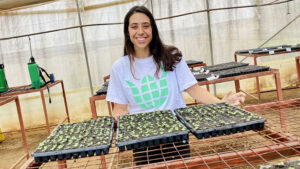
People News
The Alberta Wheat Commission has appointed Doug Cornell as its new general manager. He takes over the position following the retirement of former GM Rick Istead. Cornell will be responsible for all aspects of the development and implementation of the AWC’s strategic initiatives including its marketing, research and producer engagement programs. The AWC is a producer-directed organization representing the interests of and serving as a single voice for all of Alberta’s wheat producers.
Syngenta has appointed Darcy Pawlik to the role of head, cereals portfolio for North America, reflecting the company’s ongoing commitment to the advancement of cereals. Pawlik assumes leadership of the company’s broad cereals product portfolio, which includes crop protection, seed care and seeds. He will work to ensure business strategies are aligned with Canadian and U.S. regulatory policies concerning the commercialization and sale of cereals products. Pawlik will also work closely with other cereals team members to advance the Syngenta integrated solutions approach, which includes synergistic combinations of genetics and active ingredients, along with adjacent technologies that address specific production challenges.
MANA Canada has added Barbara Yates to its management team as regulatory manager. She will be responsible for product registration, handling government-related affairs and contributing to the new product development and innovation program. Yates has 18 years of experience in the agriculture industry, including work in research and development and regulatory affairs. Prior to joining MANA Canada, Yates worked with 3M Canada Co., United Agri Products Canada Ltd. and most recently as a regulatory consultant with TSG Canada Inc.
Arysta LifeScience North America has announced new roles for two of its sales team members. Dustin Dinwoodie assumes the role of regional sales manager for Western Canada while Trent McCrea became product manager of herbicides in Canada. Dinwoodie replaces McCrea in the regional sales position and McCrea will bring past market experience to his new role within the herbicides marketing team.
Product News
Syngenta Canada Inc. has introduced the Agrisure Duracade trait to Canadian growers for the 2014 season. Agrisure Duracade features a novel mode of action for management of corn rootworm that is distinct from the Agrisure RW trait. The Duracade trait is the first corn rootworm trait launched with insect resistance management and the preservation of technology durability in mind. It will be available to Canadian corn growers in Agrisure Duracade 5122 and Agrisure Duracade 5222 trait stacks. Both stacks will be available with E-Z Refuge, five per cent refuge blended in the bag, which offers the simplicity and convenience of automatic refuge compliance.
Canterra Seeds has announced that the launch of AC Emerson winter wheat will occur in the fall of 2014, when certified seed supplies are sufficient for a broad–scale introduction. AC Emerson is a new Canadian Western Red Winter milling wheat developed by Rob Graf at Agriculture and Agri–Food Canada. The variety has quickly gained notoriety as the first wheat of any class to be rated resistant to fusarium head blight, and is expected to be a game-changing product for areas with high FHB pressure. Canterra Seeds has been managing the seed multiplication of AC Emerson since 2011.
BASF Canada Inc. has received registration for Priaxor fungicide for use on corn and soybeans in Eastern Canada. Priaxor is the first fungicide registered in Eastern Canada containing Xemium, the new active ingredient in the carboxamide family. “The new active ingredient, Xemium, allows growers to control pathogens over a broad range of stages,” says Rob Miller, field biologist at BASF. “The main difference with Xemium is its strong mobility characteristics. It is able to redistribute itself on the plant and leaf surface to provide more continuous and consistent disease control so it can protect the parts of the plant that were missed during spraying.”
Business News
The Canadian Food Inspection Agency and Agriculture and Agri-Food Canada researchers have joined forces to support Canada’s horticulture industry. This collaborative plant health research is being carried out in British Columbia at the Sidney Centre for Plant Health and the Pacific Agri-food Research Centre in Summerland. As part of the venture, CFIA and AAFC researchers and staff are working closely together and collaborating on joint research priorities to improve efficiencies and share critical knowledge and expertise on matters of plant health.
Performance Plants Inc. and Bayer CropScience have entered into their third license agreement giving Bayer evaluation and commercial rights for PPI’s heat and drought tolerance technology in wheat. The technology has the potential to preserve yield by enhancing plant tolerance to heat, drought or combined stresses. PPI’s biotech traits can be combined or stacked into a single plant variety for genetic and agronomic improvements of all staple crops. “We are excited to extend our collaboration with Bayer to develop new varieties of high-yielding wheat,” says Yafan Huang, president and chief scientific officer of PPI. “Working with Bayer, we hope to be the first to provide effective solutions for farmers to increase the productivity of this key staple crop.”
Regina-based pedigreed seed company FP Genetics has announced it will invest $1.5 million during the next 10 years in the Canadian Prairie Spring Wheat Breeding Program at the University of Saskatchewan’s Crop Development Centre. “We have a long history of successful collaboration with the CDC and currently invest in the oat breeding program at CDC,” says FP Genetics chairman Brent McCarthy. “We see the CPS class of wheat as an area of growth within the agricultural industry and our shared goal of improving high-quality wheat varieties with elite agronomic performance will be a great partnership.”
Industry News
The Bank of Montreal Financial Group has released the results of a survey that found supporting regional economies, farmers and jobs, along with fresh food and taste, all trump the cost of food for people choosing to buy local. The report also revealed what products Canadians buy locally and why, and showed differences across the provinces on a variety of foods. The top reasons Canadians buy local, include:
• The food is fresh and tastes better (97 per cent)
• It supports the local economy (97 per cent)
• It supports local farmers (96 per cent)
• It creates local jobs (93 per cent)
• It’s better for the environment (88 per cent)
• It offers the opportunity to buy organic produce (76 per cent)
• It is less expensive (71 per cent)
Scientists from Saskatchewan-based Genome Prairie have released the DNA sequence of camelina, an oilseed crop increasingly recognized as a valuable industrial oil platform. “The completion of the genome sequence marks an important milestone that will enable businesses to be more innovative in developing camelina-based industrial bioproducts,” says Reno Pontarollo, CEO of Genome Prairie. The most important use of the genome sequence will be for current and future breeding applications.
Industry News is geared to seed professionals and delivers the people, industry, business and product news you need to know. Submissions are welcome. Email us at news@issuesink.com.












